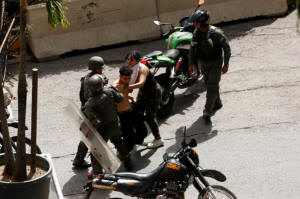Not fast or furious: nations take measured reaction to Venezuela
election
 Send a link to a friend
Send a link to a friend
 [August 13, 2024]
By Marianna Parraga, Matt Spetalnick and Lisandra
Paraguassu [August 13, 2024]
By Marianna Parraga, Matt Spetalnick and Lisandra
Paraguassu
HOUSTON/WASHINGTON/BRASILIA (Reuters) - More than two weeks after
Venezuelan President Nicolas Maduro claimed reelection victory, the U.S.
and other Western countries are showing little sign that they plan to
quickly impose tough measures for what many of them have condemned as
voting fraud.
Most governments have demanded that Venezuela's National Electoral
Council (CNE) release a full set of voting tally sheets after both
Maduro and opposition candidate Edmundo Gonzalez declared they won.
Brazil and others have been trying to secure talks between the two
sides, political rivals that have not conciliated in decades.
Protests against Maduro in the days following the vote were met with a
crackdown, with authorities denouncing the demonstrations as an
attempted "coup." The confrontation left 23 dead and more than 2,000
people arrested, according to data from the United Nations on Monday.
Western governments are trying to take it "slowly" in their reactions,
said one embassy official, who spoke on condition of anonymity because
he was not authorized to speak publicly on the matter. No government
wanted to be first on anything, he added.
Their measured response comes as they are mindful of what happened after
Maduro's 2018 reelection, three officials from different countries said.

Then, the vote was quickly condemned as a sham and led to the most
severe sanctions yet on the OPEC nation. An interim government led by
the opposition was widely recognized overseas, but the effort ultimately
evaporated, fortifying Maduro in power.
In Washington, which under Republican President Donald Trump blocked
Venezuela's critical oil exports, there seems little appetite for more
severe sanctions. Democratic U.S. officials so far have threatened but
have held off on imposing new punitive measures.
The Biden administration has been keen not to complicate the way forward
for the opposition, led by Maria Corina Machado and candidate Gonzalez,
as the Venezuelans seek "even small concessions" from Maduro, said one
person familiar with Washington's thinking.
Some of those concessions are related to open communication channels
between the two sides that the opposition hopes could lead towards an
impartial verdict on the election's results and a possible political
transition.
A review by Venezuela's Supreme Court is likely to take time and may not
lead to an impartial opinion, given that it is packed by Maduro allies.
U.S. officials have been reaching out to regional and international
partners to organize a coordinated response, the three sources said.
Cautiously, the U.S. has recognized Gonzalez as the winner of the July
28 election, but it has not called him president-elect.
"Now is the time for the Venezuelan parties to begin discussions on a
respectful and peaceful transition," said U.S. State Department deputy
spokesperson Vedant Patel on Monday.
Washington is considering a range of options "to pressure Maduro to
return Venezuela to a democratic path," he added.
However, the Biden government's remaining options appear to be limited.
The U.S. in April reimposed some oil sanctions on Venezuela, accusing
Maduro of reneging on electoral commitments, and it has enforced
numerous individual sanctions in the last five years, including on the
CNE's head, Elvis Amoroso.
[to top of second column]
|

Bolivarian National Guard detain demonstrators during protests
against results of the presidential election that awarded
Venezuela's President Nicolas Maduro with a third term, in Caracas,
Venezuela July 30, 2024. REUTERS/Leonardo Fernandez Viloria/File
Photo

U.S. officials have expressed concerns that post-election upheaval
could spur more Venezuelans to leave the country and head for the
U.S.-Mexico border, according to the Washington-based source. With
immigration already a hot-button issue, that could create new
problems for U.S. Vice President Kamala Harris in her campaign for
president.
Venezuela's foreign ministry and the U.S. Treasury Department did
not immediately reply to requests for comment. "We will not discuss
the content of our private diplomatic discussions," a State
Department spokesperson told Reuters.
FRAGMENTED AMERICAS
The Washington-based Organization of American States has failed to
agree a joint response, even as the regional group's Electoral
Cooperation and Observation issued a detailed report on
"illegalities, flaws, and bad practices" during the election.
"The official results are not trustworthy or deserving of democratic
recognition," it concluded in the July 30 report.
The presidents of Brazil, Mexico and Colombia are coordinating
action while calling for full access to voting records, while a
coalition including the U.S., Canada, Panama and others are holding
separate talks among each other and with Venezuela's opposition,
people familiar with the matter said.
Panama offered political asylum to Maduro - a controversial offering
since he is under investigation by the International Criminal Court
for allegations of human rights violations - and called for a
regional summit to discuss the election outcome.
Brazil will not recognize Maduro's victory without full disclosure
and validation of the tallies, a Brazilian government source said,
adding that officials' worries about escalating violence and threats
of more political arrests have increased.
"Messages to Maduro have been sent making clear that arresting
Gonzalez and Machado is a no-go," the source said, adding that
Brazil's focus is on dealing with both sides.
The European Union last week said there was not enough evidence to
support the results announced by the CNE, which declared Maduro the
election victor. It did not anticipate any action.

Countries including China, Russia, Nicaragua and Cuba have
recognized Maduro's victory and offered him support.
(Reporting by Marianna Parraga in Houston, Matt Spetalnick in
Washington and Lisandra Paraguassu in Brasilia. Additional reporting
by Vivian Sequera in Caracas and Daphne Psaledakis in Washington;
Editing by Rosalba O'Brien)
[© 2024 Thomson Reuters. All rights
reserved.]This material
may not be published, broadcast, rewritten or redistributed.
Thompson Reuters is solely responsible for this content. |